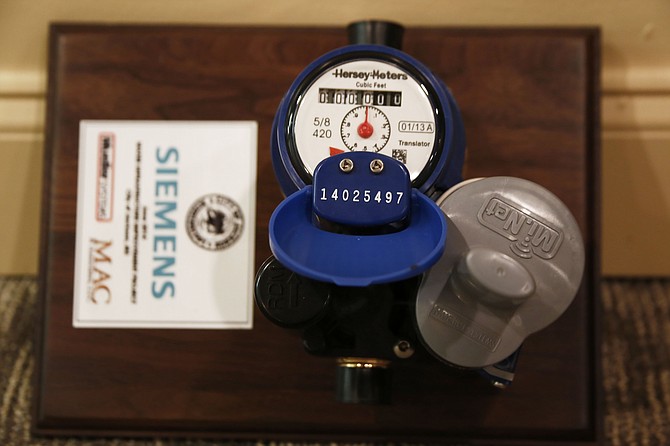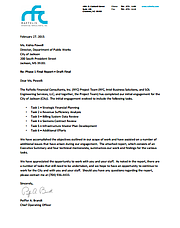Photo by Imani Khayyam.
It's almost impossible to turn on the nightly local television news without coming across a story of a Jackson resident who was shocked to open an astronomically high City of Jackson water bill after receiving a new meter. Complaints abound about Jackson's Water and Sewer Business Administration, which often involves busy signals, long hold times and multiple callbacks before actually getting a less-than-satisfying answer from a customer-service representative.
The water meter upgrade project, under way now for two years, was the single largest expense in a $91 million contract inked with Siemens Industry Inc., a division of European multinational conglomerate Siemens AG, in fall 2012.
On Friday, Feb. 13, city officials halted all new meter installations when a Department of Public Works employee found a water meter calibrated to read gallons instead of cubic feet, which could make a water bill more than six times larger than it should be. Some want to terminate the contract outright, most noisily Ward 3 Councilman Kenneth Stokes, who recently rejoined the council after serving on the board of supervisors for three years.
But for the time being, cooler heads are prevailing.
"I believe the Siemens contract wasn't the best contract ever. I've expressed my concerns over it in the past, but right now we're in, and we're inside that contract, and we need to respond," Jackson City Council President De'Keither Stamps told reporters at a March 6 press conference.
Stamps called the press conference in part to respond to a consultant's review of the Siemens contract. It wasn't pretty.
Sufficient Ammunition?
On Feb. 5, on a dangerously icy day that kept many local businesses closed, Raftelis Financial Consultants presented the findings of its report to the city council in a six-hour closed-door executive session.
Those findings concluded that the majority of the "guaranteed savings" that Siemens maintains would be realized during the contract term are not truly guaranteed.
Of the $123 million in promised "savings" over the 15-year lifespan of the contract, Raftelis says Siemens only really guarantees $40 million—on average about $2.67 million per year. To make up the rest of the money, the city would have to make deep staffing cuts, including firing its meter readers, which might not be possible or in the in the city's best interests, the consultants said.
(Raftelis also points out that, under the contract, the city wouldn't literally save money compared to pre-Siemens contract days, but rather was promised to benefit from a combination of cost cuts and increased revenues.)
"Even with automated readers, there might be some meter reading (needed)," said Peiffer Brandt, Raftelis' chief-operating officer, during his presentation, which included an audit of the city water department, to the city council last week.
Whether the Raftelis report is sufficient ammunition to recoup some of the ground Jackson has lost remains to be seen. Ward 6 Councilman Tyrone Hendrix said the report confirmed some of the suspicions he and fellow council members have long held.
"I'm just happy we have actual information and data that speak to the water infrastructure challenges in the city," Hendrix told the Jackson Free Press.
Siemens, through an emailed statement, said, "[A]s we have not seen the Raftelis report, we are unable to comment. Siemens values its relationship with Jackson and is working with the city to ensure that project goals are met."
The Jackson Free Press sent a copy of the Rafetelis report to Siemens, but the company did not respond to comment on the report's findings as of press time.
A Look Back
Armed with hard data, Stamps said he wants a thorough review of the entirety of the Siemens contract, starting with the initial contract negotiations between Siemens and the city through today.
The Siemens contract is also the largest and perhaps most complicated construction contract the city has ever signed. Former Mayor Harvey Johnson Jr., who executed the contract, said negotiations began some time in 2012 and possibly even earlier. The city solicited bids and received two or three bids, including one from Siemens.
"The city had a number of performance contracts before this, including with Siemens and Johnson Controls (no relation to the former mayor), that worked pretty well for us," Johnson said in an interview.
The current contract calls for swapping out water meters and installing new, ostensibly more accurate meters. The water-meter upgrade, including a computer systems overhaul, made up the bulk of the contract, approximately $65 million in total, roughly $1,000 for meters and computer upgrades given the 64,998 meters being installed. (As of today, about 50 percent of this upgrade is complete.)
The rest, $26 million, was designated toward updating water and sewer treatment facilities, water mains and sewer lines. The advantage was that it would help subsidize another sword of Damocles hanging over the city's treasury: the federal court order (known as the "EPA consent decree" in local political circles) requiring Jackson to literally get its crap together by upgrading the sewers to where the facilities would stop dumping raw sewage into the Pearl River.
Overhauling the water-billing system would mean, theoretically, cutting out the need for public-works crews to drive around all day reading meters and cutting peoples' water off and on, saving on wages, fuel and vehicle maintenance.
Plus, it removes the temptation for an underpaid water-department worker to forget to disconnect a delinquent customer's water in exchange for a $20 bill. Under the agreement, the city would even save $240,000 per year on the cost of replacement water-meter lids and new meters.
Improving Efficiency?
Technically speaking, the agreement is designed to be a "performance contract," a tool that came into vogue in the 1990s and 2000s as a way for government agencies to improve energy efficiency with no upfront capital costs. The energy-service company—Siemens, in this case—builds the system and, once it's complete, takes a cut of the savings off the back end.
If performance contracts sound too good to be true, that's because they sometimes are. In 2005, the U.S. Government Accountability Office looked at performance contracting by federal agencies and uncovered two problems.
First, agency officials rarely have the technical expertise to negotiate the agreements and monitor over the long term. Secondly, so few firms specialize in performance contracting that the lack of competition can actually drive costs up, the GAO found. In Mississippi, Siemens is one of four qualified performance-contracting firms.
Ellen Dannin, a former law professor who has written extensively on privatization issues, echoes the GAO's finding that government entities often are no match for huge corporations looking to win government contracts.
"The whole way these deals are structured, the industry just knows so much more than we do, and the public (sector) is so desperate, they don't do the due diligence," Dannin said.
Jackson's contract with Siemens also works differently than a typical performance contract. Instead of the contractor footing the bill for the upfront costs, the Siemens-Jackson deal required the City of Jackson to raise the bonds, then immediately start a 30-month payment schedule; to date, Jackson has paid out just over $70 million, nearly 80 percent of the contract's total value.
Indeed, Jackson's water-meter upgrade appears to be considerably more expensive than many recent urban upgrades. By comparison, the San Francisco Public Utilities Commission commenced replacing 175,000 water meters in June 2010.
Like Jackson's contract, San Francisco's meters use radio signals to transmit information back to the billing systems. The overhaul cost $50 million, funded through a 91-cent monthly fee on ratepayers bills. On average, San Franciscans paid $285.71 per new meter.
In 2011, Baltimore started upgrading water meters in Baltimore city and county. Two years later, officials there awarded an $83.5 million contract to a company from Washington state to replace 400,000 meters in the Baltimore metro. The Baltimore Sun reported that the winning bid was $101 million lower than the next lowest bid from a local firm. Later, Baltimore spent $9.7 million more for project management and another $8.4 million to a Belgian information-technology company to upgrade the water billing system. The ballooning cost drew criticism, but still the $208 per meter pales compared to the price tag for Jackson.
Johnson describes the Siemens project as a different kind of performance contract that required a different kind of financing structure because of the sheer scale and scope of the undertaking. Siemens presented the city with a package deal and Jackson's negotiating team, which consisted of city attorneys, didn't have much say when it came to details like the price of the meters. And, Johnson notes, the Mississippi Development Authority gave the deal a green light before he signed the contract.
When asked if implementation of the meters would have gone differently had he been successful in his 2013 re-election (he came in third place behind businessman Jonathan Lee and then-Councilman Chokwe Lumumba), Johnson demurs. Rather, he offers that because of his failed bid, the city never got around to hiring a project manager to make sure the Siemens contract went smoothly.
"The inference is that 'Johnson got us in this mess,' but the fact of the matter (is) if I had been re-elected, I would have hired a program manager. I was being pushed, but (people) were saying I was moving slow. I was getting flack for making sure the interests of the city were represented," Johnson said this week.
The Road Ahead
Mayor Yarber said the city is now reviewing Siemens' 11-point corrective action plan that followed the gallon-vs.-cubic-foot meter debacle. The stop-work order remains in effect while the city sorts out what went wrong, how to fix it and, possibly, how to get reimbursed for the mistakes.
"Some people will assume that we don't have any leverage in this case because we've spent $70 million," Mayor Yarber told reporters March 4 in his office. "We are Siemens' largest contract. There is no other $90 million contract except for the one that's in Jackson, Mississippi. There are two brands at stake here, Siemens' brand and the City of Jackson. We will protect our brand, and we're sure that Siemens wants to protect theirs."
Even with the Raftelis report in hand, city officials say they soon plan to sort out a lot of remaining questions. The Jackson Free Press is also working on finding that out. Using the state's public-records laws, the Jackson Free Press expects to obtain documents that will shed light on the process. We will publish that information when it becomes available in the coming days and weeks and in Part II of this report.
In the meantime, here's a look back at how the deal has gone down.
Feb. 17, 2009
President Barack Obama's American Recovery and Reinvestment Act provides $3.2 billion in block grants to manage energy-efficiency and conservation projects, including energy-performance contracting. Materials from the Mississippi Development Authority promote energy performance contracts as "a method of making the energy upgrades you need now—with no up-front capital - and paying for them later through the energy savings that result from the retrofit of the facility. Those savings can be guaranteed by the Energy Service Company."
MDA's list of approved energy-service companies includes Siemens, along with Cleveland, Ohio-based Amersco Inc., Indianapolis-based ESG Laboratories, Milwaukee-based Johnson Controls and Schneider Electric, a European conglomerate headquartered in France.
Jan. 10, 2010
After a hard freeze, water mains across Jackson begin to burst. Four days later, the city has more than 150 breaks in its water system. Jackson Public Schools and area colleges are closed most of the week, along with state offices and many businesses. Jackson public-works crews, along with teams on loan from neighboring municipalities, repaired breaks around the clock, tearing up portions of road. Eventually, Gov. Haley Barbour declares a state of emergency as nearly all Jacksonians are without water; the emergency (and, perhaps, lack of water at the Capitol building) is credited with helping state legislators recognized Jackson's infrastructure woes.
August 2011
Moody's Investor's Services downgrades the city's water and sewer debt, citing in part Jackson's failure to raise water rates to meet its debt coverage. Under the city's bond covenants, Jackson has to maintain a 120-percent debt-ratio coverage, meaning it must collect 20 percent over and above expenses specifically to pay interest on its bonds.
Failure to meet with debt-coverage ratio requirements could result in default, making it more difficult (and more expensive) to borrow for future infrastructure needs.
May 1, 2012
The Jackson City Council votes 5 to 2 to let Siemens audit the city's water system and evaluate the need for a new electronic water-meter system. Voting in favor of the performance audit were council members Quentin Whitwell, Chokwe Lumumba, Frank Bluntson, Tony Yarber and Margaret Barrett-Simon. The dissenting votes came from LaRita Cooper-Stokes and Charles Tillman.
October 2012
The city council approves a contract with Siemens, and the Johnson administration immediately touts what was for a moment called the Jackson Utility Management Program, or JUMP. The acronym was quickly abandoned.
Nov. 21, 2012
The U.S. Environmental Protection Agency (EPA), the U.S. Department of Justice, and the Mississippi Department of Environmental Quality (MDEQ) cite Jackson for violating the Clean Water Act. Between 2010 and 2012 alone, Jackson dumped 2.8 billion gallons of barely treated sewage into the Pearl, the EPA found. The EPA consent decree also charges Jackson for unauthorized bypasses of treatment at the Savanna Street Wastewater Treatment Plant, the city's largest wastewater treatment facility. Under the terms of the Siemens contract, $26 million is earmarked for consent-decree compliance, including upgrades to the wastewater plants.
Spring and Summer 2013
After the Jackson municipal elections, Johnson finishes in third place, behind businessman Jonathan Lee and then-Councilman Chokwe Lumumba. On July 1, after a run-off victory, Lumumba is sworn in as mayor.
July 22, 2013
Chris McNeil, a Siemens account representative, appears before the Jackson City Council for a presentation to precede the issuing of a notice to proceed. Mayor Chokwe Lumumba indicates that the bonds for the $90 million project have been sold, that the money is in the bank and that city would have to start paying interest on the loan by the end of the year.
During a line of questioning about hiring goals, McNeil, a former Mississippi State football player, says Siemens is on target to meet its goal for participation in the subcontracting by Jackson residents and African American business enterprises.
McNeil stresses that all subcontractors would be required to meet the same hiring benchmarks once the firm received a letter to proceed from the city.
"I give you my word. You've had my word for three years now. I've delivered on everything I said I was going to do," said McNeil, who did not respond to interview requests for this story.
Later, he added that if Siemens failed to comply with the minority-contracting plan, it would cost the company a $9 million penalty, 10 percent of the overall contract. McNeil says that "without a doubt" the city would start to see savings immediately upon starting work. Then-Public Works Director Dan Gaillet said the city had planned to start work in December 2012 and therefore anticipated $3 million in savings in the public-works budget.
Ward 1 Councilman Quentin Whitwell and Ward 3 Councilwoman LaRita Cooper-Stokes are not in attendance. Mayor Lumumba says water rates would undoubtedly increase and that the City should develop a plan to mitigate the effects of that rate hike for vulnerable people.
August 2013
On his public LinkedIn profile, Chris McNeil lists himself no longer as an employee of Siemens, but now is president of the firm McNeil Rhoads. The firm's chief executive officer is Dusty Rhoads, a member of the Flowood City Council and the son of Flowood Mayor and Levee Board Chairman Gary Rhoads.
Fall 2013
In the first and only budget Mayor Chokwe Lumumba drafts, he asks for increases in the city's water and sewer rates. Estimates are that the average monthly water bill would increase from $15.54 to around $21, and the average sewer bill would increase from $14.50 to more than $31, resulting in $30 million more in revenue. Yarber would later say he thought the move would have hurt Lumumba politically.
Dec. 10, 2013
Siemens, along with representatives of the City of Jackson and Greater Jackson Chamber Partnership, including then-Mayor Chokwe Lumumba and Chamber President Duane O'Neill and then-Chamber Chairman Socrates Garrett, host a ribbon cutting of the new Siemens office at 1919 Lakeland Drive.
June 22, 2014
Following the death of Mayor Lumumba on Feb. 25, then-Ward 6 Councilman Tony Yarber wins a special election and is sworn in as mayor.
July 2014
The city council confirms Kishia Powell, formerly the head of the Bureau of Water and Wastewater in Baltimore, Md. Powell becomes the first woman to serve Jackson as public works director and the highest-paid employee in the city earning $150,000 per year—$30,000 more than the mayor.
September 2014
Mayor Tony Yarber and Public Works Director Kishia Powell present the city council with a proposal to contract with Charlotte, N.C.-based Raftelis Financial Consultants Inc. for $200,000.
Under the contract, Raftelis would perform a water and sewer rate-sufficiency study, assist with the development of the one-percent sales tax master plan and review the performance guarantee contract the city signed with Siemens because, Powell says, no one at the city really understood that part of the contract.
The Yarber administration explains that the city fell $12 million short of the roughly $80 million in water revenue projected for the fiscal year 2014, again jeopardizing the city's bond covenants. That shortfall could result in another negative bond rating that could raise the city's interest rate for future borrowing.
Nov. 24, 2014
Mayor Yarber holds a press conference to confront rumors that he is a target in federal-level investigation related to his involvement with the passing of the Siemens contract when he sat on the city council.
Several news outlets, including the Jackson Free Press, had received a tip the previous Friday that law-enforcement officials were gathered at City Hall to arrest Yarber, who at the time was at an out-of-town conference with several members of the Jackson City Council.
During the press conference, Yarber denies that federal officials had questioned him and attributed the false rumors of his arrest to a "small group of insignificants" looking to delegitimize his administration.
Nov. 25, 2014
As expected, Moody's Investors Service again downgrades Jackson's water and sewer revenue bonds from A1 to A2 with a negative outlook. Moody's cites inadequate debt-service coverage, declining unrestricted cash, limited rate-raising history, undeveloped financial plans and a hefty consent decree with the U.S. Environmental Protection Agency that could require more borrowing.
December 2014
Council members learn for the first time that the scope of work under the Siemens contract shrank between the time the city council authorized Mayor Harvey Johnson Jr. to execute it and the time it was actually signed. (Johnson told the Jackson Free Press on March 9, 2015, that while he could not recall all the details of the negotiations, the city's evaluation determined it to be a good deal).
At the December meeting, Mark Inbody, a Siemens representative, cannot answer questions of how the reduced scope didn't also result in reduced overall costs because he was not involved in those negotiations. Ward 7 Councilwoman Margaret Barrett-Simon, who voted in favor of the contract, calls that revelation "alarming."
December 2014
During a local radio program, Yarber says he regrets voting in favor of the Siemens contract. Later, he tells the Jackson Free Press that his administration has misgivings about the Siemens contract. "I won't play lawyer, but what I do know is that we have some concerns about being able to realize the savings that have been promised through the contract. What I know now is we've done $90 million, which has primarily gone towards equipment and not into infrastructure. It's a water-line improvement project, but we haven't replaced a water line," Yarber tells the JFP, adding that instead of looking to wiggle out of the contract, he wants to figure out a way to get as much bang for the city's buck as possible.
Jan. 20, 2015
After an hour-long discussion, the city council tables a contract with Brookfield, Wis.-based Fiserv Solution Inc. to facilitate online customer billing and payments for water, sewer and garbage.
Jerriot Smash, a public-works deputy director who serves as the city's in-house Siemens project director, explains that the online payment service is separate from the customer care and billing (CC&B) software included in the Siemens contract. The cost of the Fiserv contract would be $3.15 per transaction, a reduction from $3.50 per transaction charged by Paymentus, the existing vendor that enables city residents to pay their water bill online.
"Since the water project is a key driver, we really don't have the option of being able to wait," Smash tells the council members. Ward 2 Councilman Melvin Priester Jr. presses public-works officials on why the agency initiated a professional services contract instead of going through a competitive bid process.
"I feel like everything we've done related to the water contract has been 'If you don't vote for this now we will be completely destroyed in terms of meeting our action deadlines," Priester says.
Seven days later, the council unanimously approves the Fiserv contract.
Feb. 13, 2015
Powell, in her first press conference as public works director, tells reporters that she has issued a stop-work order upon the discovery that several residents received water meters calibrated to read in gallons instead of cubic feet.
Because there are approximately 7.5 gallons to one cubic foot, a reading of a gallon meter can result in a water bill that Powell says is 648 percent higher than it should be. Powell says Siemens will be required to inspect each of the 31,000 meters that have been installed thus far and submit a corrective action plan.
Feb. 26, 2015
The Jackson Free Press submits a public-records request for "any and all materials related to the Performance Contracting Agreement with Siemens Industry Inc. Building Technologies Division," including information on requests for qualifications and proposals, financial analyses, water-department budgets and invoices from Siemens. A clerk stamps the request form with a March 9 due date, but city legal is still reviewing the documents as this issue goes to press on March 10.
March 2015
Raftelis briefs the city council on its report, including a review of the Siemens performance guarantee. After a closed-door executive session that lasts more than six hours, members of the city council make few comments about the substance of the report, but hint strongly at revelations of corruption in a city department.
The council votes unanimously to launch an investigation, and Councilman Stamps says he wants to review the entirety of the Siemens contract.
See a full archive of JFP coverage of Jackson's water challenges and the Siemens contract at jfp.ms/water. Email R.L. Nave at [email protected].
Key Firms
Siemens Industry Inc.
A U.S. subsidiary of Siemens AG, Siemens Industry Inc. calls itself "a global powerhouse in electronics and electrical engineering, operating in the industry, energy, health care, and infrastructure and cities." Founded in 1847, Siemens has headquarters in Berlin and Munich, but the company operates in 190 countries.
In fiscal-year 2013, Siemens had profits of $4.6 billion on revenues of $82.1 billion. In its literature, Siemens says its energy performance contracts "finance themselves."
According to the company's website: "With this approach, modernization work can be carried out without the need for customer capital expenditure or an immediate cash-out, because the investment costs are covered by the energy savings. Customers later benefit 100 percent from the reduction in their building's operating costs, and the modernization work on their property can boost its value too."
Garrett ECI.IV
This program-management consulting firm oversees quality assurance/quality control (QA/QC) for the water meter installation project. It is the successor to Garrett Enterprises Consolidated Inc., founded by prominent Jackson businessman and power broker Socrates Garrett. Garrett and firms linked to his companies hold a number of local and state government construction contracts. Garrett says he has retired and turned the companies over to his daughters, Talecia and Tameka, who are the president and community-outreach coordinator, respectively for Garrett ECI.IV. Mitch King is the company's Siemens project manager.
iVision IT Consultants
The firm, which James Covington owns, is a subcontractor responsible for the customer care and billing system of the water contract. Covington's firm is working with Atlanta-based Origin Consulting, also a sub-contractor under Siemens, which is working on the integration and implementation of the Oracle system. Covington is a Democratic candidate for the Mississippi House District 65.
Brilliant Minds Public Relations
Geilia Taylor's company produces marketing and promotional materials related to the water-meter installation project.
M.A.C. Consulting LLC
Jackson-based MAC is one of the subcontractors installing the water meters. The other is Pedal Valves Inc., headquartered in Luling, La. M.A.C. is owned by Marcus Wallace, who recently won election to become mayor of Edwards, Miss.
— R.L. Nave
Siemens Contract at a Glance
Total: $90,983,106
Cost Breakdown*
Development: $1.1 million
Parent Company Guarantee: $148,000
Mobilization: $11.7 million
Billing Software: $11.3 million
Water Meters: $39.8 million
J.H. Fewell Water Treatment Plant: $3.9 million
O.B. Curtis Water Treatment Plant: $6.9 million
Sewer lines: $15.8 million
*Raftelis Financial Consultants report, February 2015
Savings/Added Revenue (over 15 years)*
Construction: $503,750 (one-time)
Future Hiring: $476,000 ($7.1 million total)
Reduction in City Vehicles: $46,200 ($693,000 total)
Reduction in Fuel Consumption: $33,000 ($495,000)
Manpower, Meter Reading and Shutoffs: $1.2 million ($18 million)
Meter/Lid Purchases: $240,000 ($3.6 million)
Deferred Maintenance at Water and Sewer Plants: $1.75 million ($26.2 million)
Total 'Guaranteed' Savings: $123.2 million
*Siemens Contract









Comments
Use the comment form below to begin a discussion about this content.
comments powered by Disqus